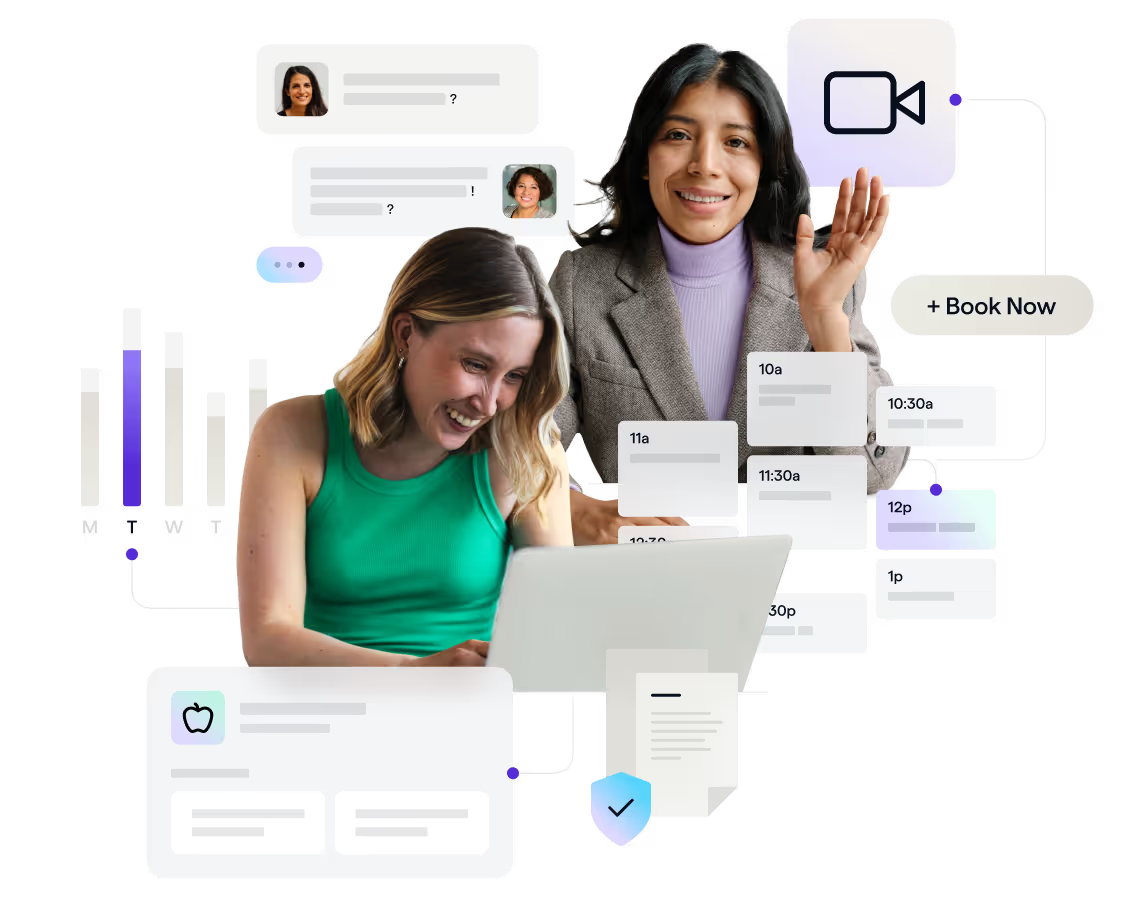

Hosting workshops and seminars for your therapy practice
Learn how to successfully host therapy workshops and seminars with this comprehensive guide. From planning and promoting your event to reviewing its success, discover tips to expand your practice and engage your community.
As a therapist, expanding your services beyond one-on-one sessions can be an effective way to grow your practice and deepen your engagement with your patients and peers. Hosting a therapy seminar or workshop allows you to share your expertise with a broader audience, build community, and offer value beyond your traditional therapy sessions. Whether you're considering hosting a therapy workshop for patients or running seminars for fellow professionals, this guide will walk you through how to plan, execute, and follow up on these events successfully.
The Benefits of hosting workshops and seminars
Workshops and seminars can benefit your therapy practice in several ways:
- Increased visibility – Hosting a seminar or workshop positions you as an expert in your field. This exposure helps build your reputation and attract new patients or professional connections.
- Revenue diversification – Offering workshops or seminars creates an additional revenue stream beyond your regular therapy sessions. You can charge a fee for attendance or offer continuing education credits (CEC) to fellow professionals.
- Building a community – These events allow you to connect with patients or other therapists in a group setting, fostering a sense of community.
- Addressing broader topics – Workshops and seminars give you the chance to explore issues that you might not typically address in one-on-one sessions, such as stress management, mindfulness techniques, or professional development in the therapy field.
Preparing for a workshop or seminar
Successful event planning begins with clear objectives. Here's how to get started when hosting a therapy workshop or seminar:
- Define the format: Webinar vs. Seminar: Decide whether you'll host a webinar or a seminar. Webinars allow you to reach a wider audience and potential patients, while professional seminars can build your network.
- Determine the purpose and audience: Clarify the goal of your event. Your goal could be to target current and prospective patients for a specialized topic, such as coping skills for anxiety, communication skills in relationships, or establishing healthy boundaries. For a professional development seminar, you might instead choose a topic such as advanced CBT techniques or providing culturally competent therapy. No matter your desired topic - knowing your audience will shape your content and delivery.
- Set the duration: Most therapy seminars and workshops range from 1 to 3 hours, depending on the depth of the topic. Make sure your content fits the time frame, allowing for breaks, questions, and interactive elements.
- Establish goals and key takeaways: Set clear learning objectives or practical outcomes for attendees, so their expectations are in line with your intentions. For example, a mindfulness workshop might include guided exercises and tips for daily practice, while a professional development seminar could offer therapists new tools to integrate into their practices.
- How much should you charge?: The price of your event will depend on several factors:
- For patients: Consider the depth of the content and the value your patients will gain. Typical workshop fees range from $50 to $200.
- For professionals: If you’re offering continuing education credits, you can charge more—$100 to $500 or more, depending on the level of expertise, the length of the seminar, and if your content is eligible for CEC. Always ensure that your pricing reflects the value of the experience, the materials you provide, and any certifications or takeaways the attendees will receive.
- Consider offering continuing education credits (CEC)
If you’re hosting a seminar for fellow professionals, offering CEC can be a major draw. Check with your local licensing board to ensure that your seminar meets the criteria for providing these credits.
{{pp-newsletter-signup}}
How to drive attendance to therapy workshops
Once you’ve planned your webinar or seminar, the next step is to ensure that people show up! You’ve worked hard to create valuable, engaging content, and promoting your event effectively is key to making sure you reach your audience.
Leverage your existing patient base
Send personalized emails or announcements to your current patients, letting them know about the workshop or seminar. Explain how attending could benefit them and their therapy journey. Let them know that this event is not exclusive to your existing patients, in case they know someone that would also benefit.
Use social media marketing
Promote your event on social media platforms where your target audience is active. Create event pages on Facebook or LinkedIn and share engaging content leading up to the event, such as sneak peeks of what attendees will learn.
Leverage your referral network
Let your peers know about your event so that they can co-promote it to those that would benefit.
Use targeted ads
Running a targeted ad campaign on platforms like Google or Facebook can help you reach a larger, more specific audience. Focus on promoting the unique value of your event, whether that’s access to your expertise or the opportunity to earn continuing education credits.
Offer early bird pricing or discounts
Encourage early sign-ups by offering discounted rates for those who register in advance. This can help you gauge interest and ensure a solid base of attendees before the event.
What to do after you’ve hosted
Once your event is over, the work doesn’t stop. Follow-up is essential to ensure attendees found value and to measure the success of your seminar or workshop.
- Send a thank-you email: Some would say that sending thank-yous is a lost art - and we agree. After hosting a therapy seminar or webinar, send a follow-up email to thank attendees for participating. In the email, you can include:
- A summary of the key points discussed
- Additional resources or materials
- A link to any recordings, if applicable
- A feedback survey to gather insights on how you can improve future events
- Review the success of the event: Take the time to evaluate the event’s performance. Did you meet your attendance goals? Were participants engaged? Did any attendees convert to patients? Use the feedback from attendees to adjust your future events.
- Strategize for your next event: Based on the feedback and your own reflections, start planning your next workshop or seminar. Identify areas where you can improve, such as marketing strategies or the content delivery, and apply those lessons to make your next event even more successful.
Healthie supports workshops and seminars
When it comes to tools for hosting a seminar or workshop, using the right technology platform can make all the difference. Healthie, an all-in-one practice management solution, makes it easy for therapists to organize, promote, and host workshops and seminars.
- Webinar integration – Healthie integrates with Zoom, allowing you to seamlessly host webinars for your patients or colleagues. Learn how HERE.
- Registration and payments – You can use Healthie to set up registration forms, accept payments, and track attendance, ensuring a smooth process from start to finish.
- Engagement – Following the event, you can continue engaging attendees by providing follow-up resources or scheduling one-on-one sessions through the platform.
Whether you're hosting a therapy workshop for patients or running a seminar for professionals, Healthie’s platform can help streamline the process, saving you time and effort while ensuring a successful event. Hosting these workshops and seminars not only helps expand your practice, but also allows you to provide valuable educational opportunities that benefit both your patients and the broader community.






